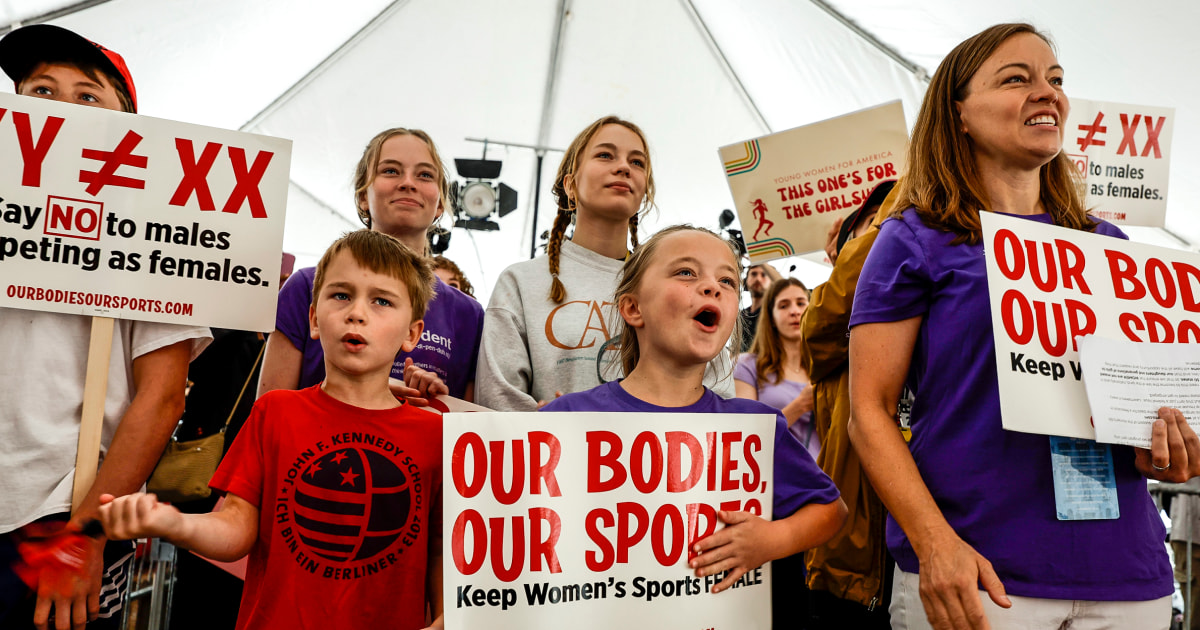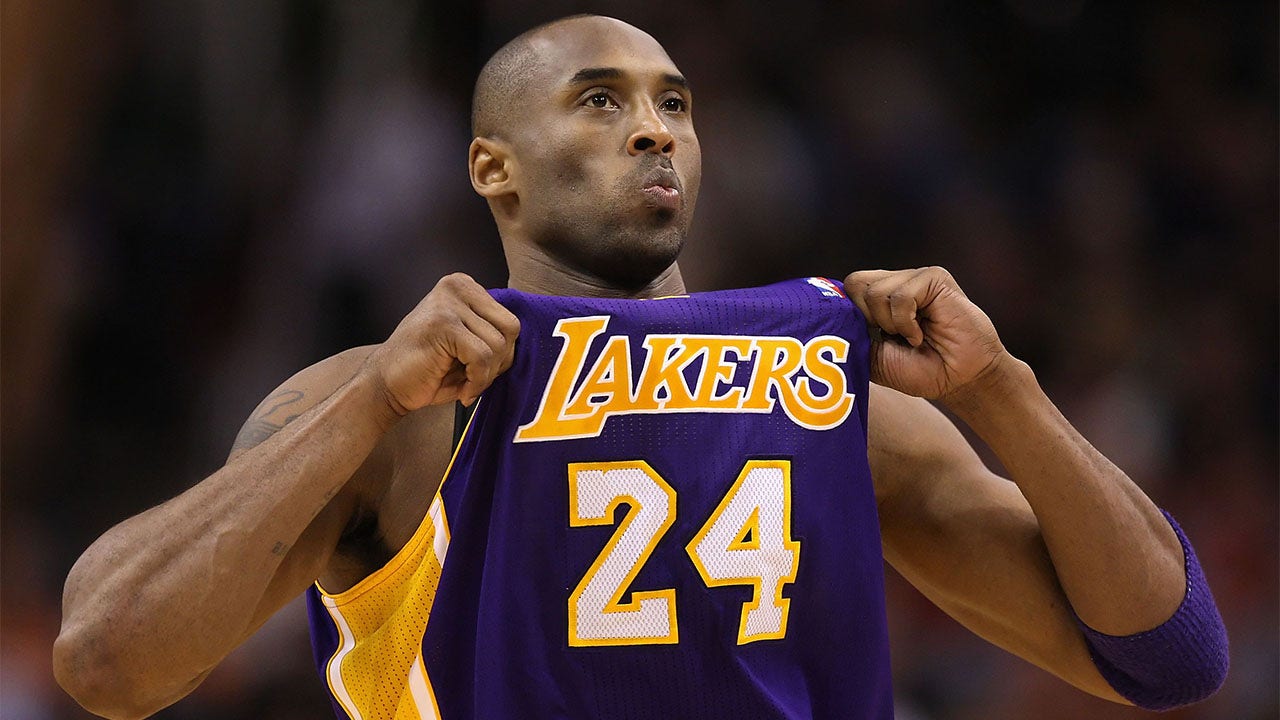Trump signs executive order banning trans women from women’s sports

President Donald Trump signed an executive order Wednesday prohibiting transgender women and girls from competing in female sports. The measure, called the “No Men in Women’s Sports Executive Order,” is the fourth executive order targeting transgender people he has signed since he took office Jan. 20.
“The radical left has waged an all-out campaign to erase the very concept of biological sex and replace it with a militant transgender ideology,” Trump said from a podium at the White House, with dozens of women and girls standing behind him. “With this executive order, the war on women’s sports is over.”
Trump also gave multiple examples of what he described as “men claiming to be girls” and “stealing” victories, at one point perpetuating the false claim that Algerian female boxer Imane Khelif, who faced intense scrutiny over her gender at the Paris Olympics in August, was assigned male at birth.
In a call with reporters Wednesday morning ahead of the signing, White House officials said that they expect headlines about the executive order to use the word “transgender” but that “this has nothing to do with that.” The order, they said, aims to protect women’s access to safe and fair athletic opportunities, and it will do that in two ways, they said.
First, officials said, the administration will roll back the Biden administration’s guidance on Title IX, a civil rights law that prevents sex-based discrimination in education programs and activities that receive federal funding. Under that guidance, schools were required to allow trans students to access school sports teams and sex-segregated facilities that align with their gender identities. Trump’s order will, instead, bar students assigned male at birth from participating in girls’ and women’s sports and using women’s restrooms. The Education Department will be tasked with investigating potential violations, and the administration “will be asking for investigations,” the officials said.
Second, officials said, the administration will work with sports governing bodies, including the International Olympic Committee, to ensure the guidance is followed in noneducational settings. The guidance, they added, will affect U.S. visa policies.
“If you are coming into the country and you are claiming that you are a woman but you are a male here to compete against women, we’re going to be reviewing that for fraud,” one of the officials said.
Charlie Baker, the president of the NCAA — a nonprofit organization that regulates student athletics among 1,100 colleges and universities across the U.S. — issued a statement Wednesday saying the association was reviewing Trump’s order and would “take necessary steps to align NCAA policy.“
By Thursday afternoon, the association announced an update to its transgender student-athlete policy: NCAA women’s sports will be restricted to students assigned female at birth, while the men’s category will be open to all student athletes, regardless of their sex assigned at birth.
“This national standard brings much needed clarity as we modernize college sports for today’s student-athletes,” Baker said in a statement on Thursday along with the policy announcement.
The timing of the “No Men in Women’s Sports Executive Order” does not appear to be coincidental: Wednesday was the 39th annual National Girls & Women in Sports Day, which was started in 1987 as a way to celebrate female athletes and inspire girls to participate in sports.
The issue of transgender women participating in women’s sports was a consistent and divisive topic leading up to the November elections. On the campaign trail — and even after he won the election — Trump referred to trans women as men and pledged to “keep men out of women’s sports.”
A Gallup survey of U.S. adults conducted in May 2023 found that nearly 70% of respondents said trans athletes should be allowed to compete only on sports teams that correspond with their birth sexes, up from 62% in 2021. Twenty-seven states already have laws, regulations or policies banning transgender students from participating in sports consistent with their gender identities, according to the Movement Advancement Project, an LGBTQ think tank.
Former Harvard University swimmer Schuyler Bailar, who made history in 2015 as the first openly transgender athlete to compete on an NCAA Division I men’s team, called the order “absolutely devastating” and “discriminatory.”
“This, I think, is a really horrible way to invite a lot of discrimination — not just against trans people — but also against all people in the women’s category, because this is a policing of women’s bodies in sports.” said Bailar, 28.
Riley Gaines, a former college swimmer who has become an outspoken opponent of trans women in women’s sports, applauded the trans sports ban on social media Tuesday and attended the signing ceremony Wednesday.
Gaines wrote on X: “Things could’ve been so different. Gender insanity was the final straw that brought a lot of moderates to the side of common sense. Specifically, I believe it was the issue of men in women’s sports. I’ve been living in a state of gratitude everyday since Nov 5th. Praise God.”
A number of LGBTQ rights organizations criticized the order after Trump signed it Wednesday. Carl Charles, a senior attorney for Lambda Legal, an LGBTQ legal advocacy organization, said the order “takes aim at K-12 and college athletes — a vanishingly small subset of people who on the whole, outside of a few sensationalized examples, have been participating in school sports programs for decades with absolutely no issues.”
“We are appalled, and in fact disgusted, at this administration’s insatiable appetite for fearmongering about and relentless targeting of this most vulnerable population,” Charles said. He added that multiple states that have enacted restrictions on trans athletes’ participation have faced lawsuits.
Courts have blocked state bans in Arizona, Idaho, Utah and West Virginia. New Hampshire’s restriction has been blocked against the two trans plaintiffs who sued, and Montana’s law has been permanently blocked from taking effect in colleges but not K-12 schools, according to the Movement Advancement Project.
Before Wednesday’s trans sports order, Trump signed three others that directly target transgender people. On Inauguration Day, he signed an order proclaiming that the government will recognize only two sexes, male and female, and that “these sexes are not changeable.” He also signed orders barring transgender people from serving openly in the military and restricting access to gender-affirming care for trans people younger than 19 nationwide.
Related
Why the Four Nations Face-off was a runaway success for…
CNN — When Connor McDavid’s shot hit the back of the net to end Thursday’s showd
Canada defeats USA in overtime to claim hockey’s first 4…
The stakes were further raised amid ongoing political tensions between the U.S. and Canada. In recent weeks, President Donald Trump has promoted the idea that t
Wayne Gretzky Gets in Trouble With Fans for Gesture Towards…
The atmosphere is electric among the hockey fans during the 4 Nations Face-Off championship game between Team USA and Canada. The situation has escalated to the
Trump announces Kobe Bryant, Muhammad Ali and Jackie Robinson statues…
President Donald Trump announced Thursday that the National Garden of American Heroes will be getting statues of American sports legends.During a Black History












